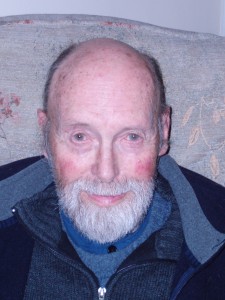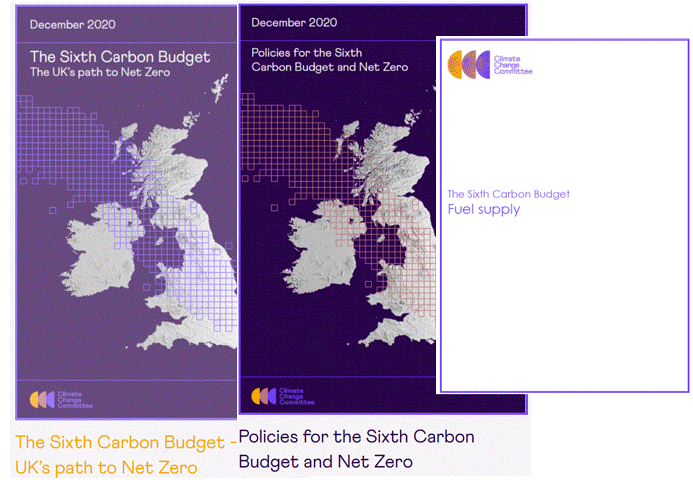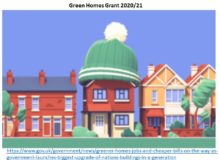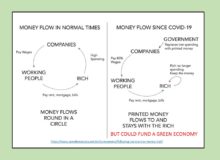Extracts from the writings of John Mead (1925-2014)
John was the co-founder of HiCAN and wrote this in 2007:

When we consider the scale of the threat to the global climate, and therefore to human life, the imminence of that threat, and the almost total failure to take action that might avert it, it is obvious that our entire culture, indeed our entire civilization, is in a most extraordinary mess.
The conclusions of the majority of climate scientists and the IPCC are that we have very little time in which to avert climate catastrophe – at the most ten years. If the climate scientists are right, we are as a civilization confronted by a terrifying prospect. The IPCC predicts that by 2050 there will be 150 million environmental refugees.
We must set out to join forces, to meet together, in small groups, and discuss our understanding of the situation, and our feelings about it, and how we are to achieve collective action.
We are certainly perilously near a “tipping point” in terms of climate change. It is possible that we are near a “tipping point” in terms of public awareness and readiness to act. What is now needed – and with great urgency – is the establishment of that capacity for collective action. We need to use that collective action to put massive pressure on politicians to take those measures which can yet save our civilization and the future of human life
It was in 1987 that Gro Harlem Brundtland, the Norwegian Prime Minister, published Our Common Future on behalf of the Commission of the United Nations.
“sustainable development is development that meets the needs of the present
without
compromising the ability of future generations to meet their own needs“
This clear concept is relevant to organisations whose purpose is to consider the conditions of future generations (or future conditions for people living today). They increasingly realise they should not support the continuation and expansion of fossil fuel use that will compromise the lives of future generations. Hence Universities, Faiths and Pension Funds are beginning to divest their investments from fossil fuels and into the renewable energy sector.
Religious Leaders
Leaders of UK Jewish, Muslim, Church of England and Catholic Faiths confirmed their shared views on the duty of people of all religions in a letter to the Daily Telegraph on 16th June 2015:
“SIR – We write as faith leaders representing communities across the UK, united by our shared concern about climate change.
Thousands of us will be lobbying our elected officials tomorrow in Westminster. We welcome people of all faiths and none to join us. We urge the newly elected Government to take the necessary action to tackle climate change: we will support them every step of the way.
Our faith calls us to care for creation and respect the environment created by God. It is our duty to care for our planet so that our children and our grandchildren can enjoy it as we have done, and because it is the world’s poorest people who are already suffering the impacts of a changing climate.
Ban Ki-moon, the UN Secretary General, was right when he recently said: “Science and religion are not at odds on climate change. Indeed, they are fully aligned.”
Rt Rev Nicholas Holtam
Bishop of Salisbury
Rabbi Laura Janner-Klausner
Senior Rabbi to Reform Judaism
Shaykh Ibrahim Mogra
Assistant Secretary General, Muslim Council of Britain
Rt Rev John Arnold
Catholic Bishop of Salford”
Muslim Leaders
Prominent Muftis scholars and climate change experts issued a call in August 2015 for Muslims to work towards phasing out Greenhouse gas emissions by 2050 at the International Islamic Climate Change Symposium arranged by the Islamic Foundation for Ecology and Environmental Sciences (IFEES). Stating that: “We bear in mind the words of our Prophet (peace and blessings be upon him):
The world is sweet and verdant, and verily Allah has made you stewards in it, and He sees how you acquit yourselves (Hadīth related by Muslim from Abu Sa‘īd Al-Khudrī)
The declaration included:
“We call upon the Conference of the Parties (COP) to the United Nations Framework Convention on Climate Change (UNFCCC) and the Meeting of the Parties (MOP) to the Kyoto Protocol taking place in Paris this December, 2015 to bring their discussions to an equitable and binding conclusion.”
“We particularly call on the well-off nations and oil-producing states to – Lead the way in phasing out their greenhouse gas emissions as early as possible and no later than the middle of the century;……..”
“We call on the people of all nations and their leaders to – Aim to phase out greenhouse gas emissions as soon as possible in order to stabilize greenhouse gas concentrations in the atmosphere;……..”
“We call upon corporations, finance, and the business sector to – Shoulder the consequences of their profit-making activities, and take a visibly more active role in reducing their carbon footprint and other forms of impact upon the natural environment;…….”
“We call on all groups to join us in collaboration, co-operation and friendly competition in this endeavour and we welcome the significant contributions taken by other faiths, as we can all be winners in this race.”
Catholic Christian Leader
Pope Francis issued an encyclical on 19th June 2015 on care for our common home, instructing Catholics and inviting others to respect the planet. “14. I urgently appeal, then, for a new dialogue about how we are shaping the future of our planet. We need a conversation which includes everyone, since the environmental challenge we are undergoing, and its human roots, concern and affect us all. The worldwide ecological movement has already made considerable progress and led to the establishment of numerous organizations committed to raising awareness of these challenges. Regrettably, many efforts to seek concrete solutions to the environmental crisis have proved ineffective, not only because of powerful opposition but also because of a more general lack of interest.” Click here for link to audio download.
Protestant Christian Leader
Archbishop Desmond Tutu spoke of Climate Change as a moral and economic imperative. “The moral imperative is indisputable, as the effects of climate change – including extreme weather, temperature changes, and rising sea levels – are felt most keenly by the global poor, who have also benefited the least from the economic activities that cause it. Moreover, climate change could accelerate poverty and inequality in the future, meaning that, unless we address it in a timely manner, it will diminish – or even eliminate – future generations’ chances to achieve their development goals. Making every effort to minimize climate change today is, quite simply, the right thing to do.
Fortunately, the economic benefits of addressing climate change are also clear. After all, climate change carries significant economic costs – for example, those associated with more frequent and extreme weather events. Moreover, building a “green” economy, based on continued technological innovation, is the smartest and most efficient way to create new engines of sustainable growth and job creation for the next generation.”
In August 2015 Barack Obama announced his Climate Change Action Plan, including the intention to pass the The Clean Power Plan that “sets achievable standards to reduce carbon dioxide emissions by 32 percent from 2005 levels by 2030.”
His announcement explained that the weather was getting more extreme and that carbon pollution is Causing Climate Change. The Clean Power Act is designed to increase renewable energy, increase carbon sequestration, reduce energy wastage and to lead the way at International Negotiations on Carbon Reductions. Although the Act is being opposed by States that profit from fossil fuels he said in Feb 2016 that he can argue that the EPA is obliged to regulate where public health is at risk.
The US is leading the Clean Energy Ministerial Initiative, whereby different countries lead and participate in areas such as Solar and Wind, Smart grids etc.
In the lead up to the Paris COP21, and during its intense sessions, Barack Obama personally encouraged progress and persuaded world leaders to come to an historic outcome.
And in his final State of the Union address in Jan 2016 he had no patience for climate change deniers.
In light of the influence that the President of the United States of America holds, and the difficulties Barack Obama has had to contend with from internal powerful vested interests his leadership qualifies Barack Obama to be included here as a climate change Thought Leader.



